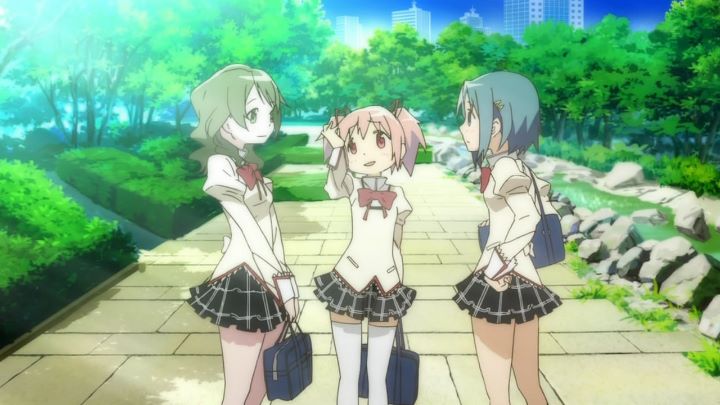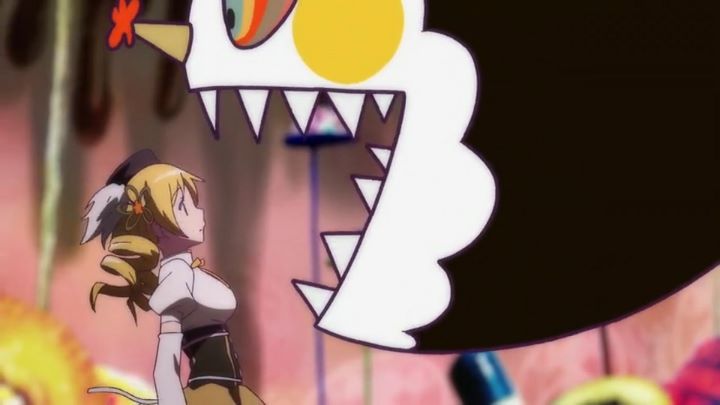










There's a lot of anime out there. Where do you start? If you don't want to waste time, you would first seek out the classics that die-hard fans consider "mandatory viewing." There's a lot of sleeper hits worth seeking out, but every decade has a handful of anime shows that trump all others, in terms of story, animation, or, most importantly, popularity. For the 2010's decade, the 2011 series "Puella Magi Madoka Magica" (commonly shortened to just "Madoka Magica" by viewers) is most certainly one of those important shows. Effectively just another entry in the common "magical girl" genre of anime, it popularized the term "deconstructing the genre" among anime reviewers (a term and trend that would attempt to repeat afterwards in other shows, until everyone was sick of the phrase). Even a decade later, people still talk about it. It was bold. It was revolutionary. It was a gateway for new fans to discover the potential of the medium.If you have only seen promotional art and have avoided story spoilers, you might not know what all the fuss is about. The characters have a unique art style that could be described as "overwhelmingly cute," the type of design that would discourage certain viewers, especially people who never understood the appeal of the anime art style. And the story... isn't it just like "Sailor Moon," "Pretty Cure," or the countless other shows aimed at girls under the age of 10? Fans of "Madoka Magica" will be quick to say this is NOT a show for children. A show of violence in episode 3 is so jarring that audience hype skyrocketed for the rest of the series from that point forward. But even in the opening moments of the first episode, it's clear something isn't quite right. It's a dream sequence of the main character, a pink-haired girl named Madoka, walking up a seemingly endless flight of stairs in a black-and-white hall, opening the doors to find a future prophecy, of her friends fighting desparately against an imaginative-looking and seriously dangerous demon. "You can save them," Madoka is told. But if that's true, why is there any hesitation? The tone and music in this moment feels foreboding, and when the show transitions to a normal day of going to school with her friends, the viewer is left wondering what secrets the show will tell in the episode to come.In this case, "deconstructing" the magical-girl genre tries to answer the question as to why these fairy-girl-heroes exist. Normally, a cute mascot-animal randomly shows up and gives an otherwise normal girl magical powers, asking for their help to fight for truth, justice, and love. In "Madoka Magica," the writers ask: why would a random magic cat give powers away for free? To fight monsters and save humans? If so, where do the monsters come from? And why would the animal care? Written by Gen Urobuchi, "Madoka Magica" would help make him a household name in otaku-homes, and his fan nickname "Gen the Butcher" gives a clue about how dark the series gets. Characters die, and not just in a puff of smoke or flash of light. And not just for losing a battle against the abstract monsters in the shadows: in this universe, there is a consequence for agreeing to the contract of becoming a magical girl, in exchange for the suspicious promise of having any one wish granted. No woman will fantasize about becoming a magical girl after watching this show.  Thankfully, it's not purely a plot made for the sake of shock value or horror. The lore built here is rich, and the core conflict and true mission (after truths about their situation are made clear) are a great example of character-driven plot. And the ending of this stand-alone original story is excellent, clearly well-thought out from the beginning, a satisfying conclusion, with a final scene that subtly hints at a possible direction for sequels to follow. Despite fanfare, no such sequel series has been produced to continue the story, aside from the controversal movie sequel "Rebellion," which can be taken or ignored at your choice. By itself, the series stands well as a modern fairy-tale. The art style might be most decisive for the overtly-cute girls. Ignoring that, great work is done on the hyper-stylized backgrounds and architecture, a common trademark for director Akiyuki Shinbo and Studio Shaft. The monsters themselves, and the realms they live in, are distinct from each other, but each use a unusual art and animation style of cut-out magazine collages. It's like giving characterization to a creepy ransom note. These moments make "Madoka Magica" feel like fine art in the shell of a common anime show, something most anime fans aren't accustomed to, and something most studios don't find opportunities to insert. The music switches from both light-hearted and dark, especially noticeable in the contrast between the opening and ending theme songs, but also throughout the series' soundtrack. Yuki Kajiura did the score, at the time already popularized from her work in "The Garden of Sinners."Indeed, Urobuchi, Shinbo and Kajiura were the biggest players in the anime industry in 2011, and their collaboration in "Puella Magi Madoka Magica" produced something close to a masterpiece that would propel their careers for years to come. The cute character designs and grim themes and violence won't be for everyone (even for fans of either, seeing both together would reduce the ideal audience even further), but might bring a nice pop of color to the typical goth's library of favorite works. For the curious and adventurous, I encourage you to give the show a try, if you haven't already. Then you'll be able to join the years-long conversations fans have been having, as well as be able to discover even more anime that strives to be more than purely "Saturday-morning entertainment."... or to save time or money, consider viewing the compilation films "Beginnings" and "Eternal," which manage to retell the story without losing its effectiveness, aside from an odd separation point between the two or a couple lost scenes.
Thankfully, it's not purely a plot made for the sake of shock value or horror. The lore built here is rich, and the core conflict and true mission (after truths about their situation are made clear) are a great example of character-driven plot. And the ending of this stand-alone original story is excellent, clearly well-thought out from the beginning, a satisfying conclusion, with a final scene that subtly hints at a possible direction for sequels to follow. Despite fanfare, no such sequel series has been produced to continue the story, aside from the controversal movie sequel "Rebellion," which can be taken or ignored at your choice. By itself, the series stands well as a modern fairy-tale. The art style might be most decisive for the overtly-cute girls. Ignoring that, great work is done on the hyper-stylized backgrounds and architecture, a common trademark for director Akiyuki Shinbo and Studio Shaft. The monsters themselves, and the realms they live in, are distinct from each other, but each use a unusual art and animation style of cut-out magazine collages. It's like giving characterization to a creepy ransom note. These moments make "Madoka Magica" feel like fine art in the shell of a common anime show, something most anime fans aren't accustomed to, and something most studios don't find opportunities to insert. The music switches from both light-hearted and dark, especially noticeable in the contrast between the opening and ending theme songs, but also throughout the series' soundtrack. Yuki Kajiura did the score, at the time already popularized from her work in "The Garden of Sinners."Indeed, Urobuchi, Shinbo and Kajiura were the biggest players in the anime industry in 2011, and their collaboration in "Puella Magi Madoka Magica" produced something close to a masterpiece that would propel their careers for years to come. The cute character designs and grim themes and violence won't be for everyone (even for fans of either, seeing both together would reduce the ideal audience even further), but might bring a nice pop of color to the typical goth's library of favorite works. For the curious and adventurous, I encourage you to give the show a try, if you haven't already. Then you'll be able to join the years-long conversations fans have been having, as well as be able to discover even more anime that strives to be more than purely "Saturday-morning entertainment."... or to save time or money, consider viewing the compilation films "Beginnings" and "Eternal," which manage to retell the story without losing its effectiveness, aside from an odd separation point between the two or a couple lost scenes.